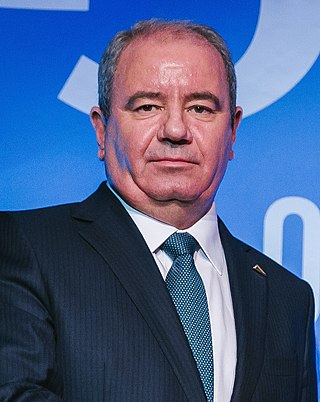
The National Telecommunications and Information Administration (NTIA) is an agency of the United States Department of Commerce that serves as the president's principal adviser on telecommunications policies pertaining to the United States' economic and technological advancement and to regulation of the telecommunications industry.

James Henry Quello was a broadcaster and government official who notably served as acting Chairman of the Federal Communications Commission (FCC) in 1993. Described as a "conservative Democrat", Quello was first appointed to the FCC by Republican president Richard Nixon. Quello's term as acting chairman ended when Reed Hundt was confirmed by the Senate, and he stepped down from the FCC entirely in 1998.

King Mongkut's Institute of Technology Ladkrabang is a research and educational institution in Thailand. It is situated in Lat Krabang District, Bangkok approximately 30 km east of the city center. The university consists of nine faculties: engineering, architecture, science, industrial education and technology, agricultural technology, information technology, food industry, liberal arts, and medicine.

The Harvard T.H. Chan School of Public Health is the public health school of Harvard University, located in the Longwood Medical Area of Boston, Massachusetts. The school grew out of the Harvard-MIT School for Health Officers, the nation's first graduate training program in population health, which was founded in 1913 and then became the Harvard School of Public Health in 1922.

William H. Dutton is former Director of the Oxford Internet Institute, Professor of Internet Studies, University of Oxford, and Fellow of Balliol College. He also has a chair in Michigan State University's Department of Media and Information, where he is Quello Professor of Media and Information Policy. He was previously a Professor in the Annenberg School for Communication at the University of Southern California, which he joined in 1980, where he was elected President of the Faculty.
Christopher H. Sterling was an American media historian. Sterling was professor of media and public affairs at The George Washington University where he taught from 1982. Author of numerous books on electronic media and telecommunications plus a host of research and bibliographic articles, his primary research interests centered upon the history and policy development of electronic media and telecommunications. He regularly taught courses in media law and federal regulation and society. He was an acting chair in the early 1990s and served as associate dean for graduate studies in arts and sciences from 1994 to 2001.
Lin Yi-bing or Jason Lin is a Taiwanese academic who has served as the Chair Professor of the Department of Computer Science and Information Engineering (CSIE) at National Chiao Tung University (NCTU) since 1995, and since 2002, the Chair Professor of the Department of Computer Science and Information Management (CSIM), at Providence University, a Catholic university in Taiwan. He also serves as Vice President of the National Chiao Tung University.

Shane Greenstein is an American economist. He is the Martin Marshall Professor of Business Administration at the Harvard Business School. He is the author of two books and the co-editor of three. He has published research about Wikipedia.

Johannes M. Bauer is the Quello Chair for Media and Information Policy in the Department of Media and Information at Michigan State University, East Lansing, Michigan. He also serves as the Director of the James H. and Mary B. Quello Center at Michigan State University.

Steven S. Wildman is a U.S. scholar, academician and researcher who teaches and researches at one of the top-rated American communications programs at the Department of Telecommunication, Information Studies and Media at Michigan State University in East Lansing, Michigan. Wildman also serves as co-director of the university's Quello Center for Telecommunication Management and Law.

Eli M. Noam is an American economist and professor at Columbia Business School, where he is the Paul Garrett Chair in Public Policy and Business Responsibility. He is the director of the Columbia Institute for Tele-Information (CITI). He works on the economics, management, and policy of media and the digital world, most recently on global media ownership and on next-generation “Cloud-TV”. He has written over 400 articles and has authored, edited, and co-edited over 30 books.
The Columbia Institute for Tele-Information (CITI) is one of several research centers for Columbia Business School, focusing on strategy, management, and policy issues in telecommunications, computing, and electronic mass media. It aims to address the large and dynamic telecommunications and media industry that has expanded horizontally and vertically drive by technology, entrepreneurship and policy.

Ernest James Wilson III is an American scholar. Wilson was the Walter Annenberg Chair in Communication, and Dean of the Annenberg School for Communication at the University of Southern California (USC), Los Angeles, California from 2007 to 2017. He stepped down as dean in June 2017 and was succeeded by Willow Bay. Dr. Wilson is the founder of USC Annenberg's Center for Third Space Thinking, which is devoted to research, teaching and executive education on soft skills in the digital age. Through the center, Dr. Wilson's most recent research focuses on critical workforce competencies and talent and skills development in the 21st Century. As a fellow at the Center for Advanced Study in the Behavioral Sciences at Stanford University, he currently is writing a book on utilizing competencies via the framework of Third Space Thinking.
Hwang Jun-seok is a South Korean engineer. He currently serves as a Director and Dean of the Technology Management, Economics and Policy Program (TEMEP) and of the International Information Technology Policy Scholarship Program (ITPP) at the Seoul National University and Associate Professor at the Seoul National University.

Ali Abbasov Mammad oglu was the Minister of Communications and Information Technologies of the Republic of Azerbaijan between 2004 and 2015.
Jorge Reina Schement was dean of what is now the School of Communication and Information at Rutgers, The State University of New Jersey. Schement is a Professor II of Communication, Professor II of Latino-Hispanic Caribbean Studies, and Professor II of Public Policy at Rutgers.

Amit Schejter is Professor of Communication Studies at Ben-Gurion University of the Negev in Israel and Visiting Professor of Communications and co-director of the Institute for Information Policy at the Donald P. Bellisario College of Communications of the Pennsylvania State University. He is the former President of Oranim College.
David Mark Kennet is an independent economic consultant. He has previously been on the faculties of three universities and written a number of professional journal articles and has authored or co-authored two books.
Robert M. Pepper is an American specialist in communications policy.
Jeff MacKie-Mason is an American economist specializing in information, incentive-centered design and public policy. MacKie-Mason is the university librarian and chief digital scholarship officer of the University of California, Berkeley, where he is also a professor in the School of Information and a professor of economics. At the University of Michigan he was the Arthur W. Burks Collegiate Professor of Information and Computer Science at the School of Information, professor of economics, and professor of public policy at the Gerald R. Ford School of Public Policy. MacKie-Mason was the founding director of STIET, a research program for Socio-Technical Infrastructure for Electronic Transactions funded by the National Science Foundation bridging together over 60 faculty and doctoral students in economics and computer science research.


















